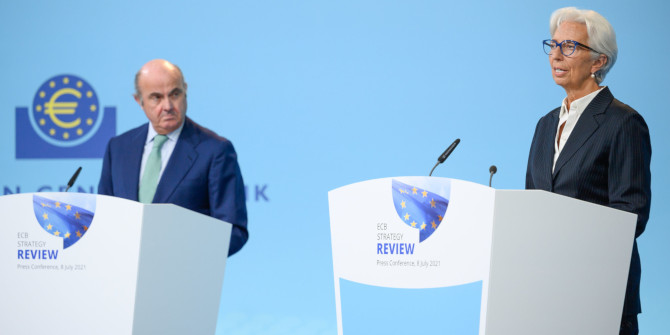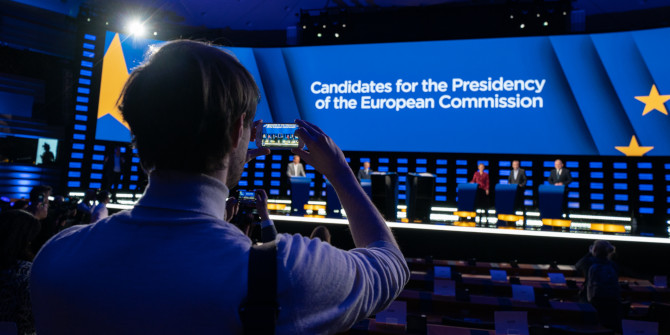The 2024 European Parliament elections promise to be a pivotal moment for the European Union. Claes de Vreese presents a roadmap for how politicians, journalists and citizens can ensure the success of the elections.
This article is part of a series on the 2024 European Parliament elections. The EUROPP blog will also be co-hosting a panel discussion on the elections at LSE on 6 June.
The 2024 European Parliament elections are now only weeks away. Parties and candidates are sharing their visions about the big topics affecting Europe and the world. However, it is important to remember that these elections are not about the EU itself, but about electing the next European Parliament. This implies that national politicians should step aside and leave the campaigning to actual candidates for the European Parliament.
We have seen in the past that national politicians often step in during the campaign. This sends the wrong signal. Additionally, national politicians should also be reminded that “the EU” is the sum of its member states. There is little point in national politicians blaming “the EU” for decisions they participated in. The message for all parties, whether on the right, the left or in the centre, is that the European Parliament elections are not a referendum on the EU.
What voters need from parties
Too often in the past, centrist parties have shied away from full blown campaigning in European Parliament elections due to internal party dynamics or disagreements. This leaves the stage open for parties and candidates with stronger stances, which in some countries reduces the campaign to a vote on more or less Europe, or being in and out of the EU.
If pro-European parties like the EU, this is fine, but we should be asking these parties to tell us what topics they want to tackle in the next parliamentary period and how. Similarly, it is perfectly fine for Eurosceptic parties to dislike the EU, but again, we need to hear about the topics they want to tackle.
It would also be beneficial if parties explained to voters why different parties are members of the same political group in the European Parliament and why not all parties within a group are similar. This is an issue that voters could understand with some genuine guidance. Parties should also explain to voters why co-legislation after the election will involve making grand coalitions, where a fragmented parliament engages in compromises across all kinds of conflict lines.
An end to lazy EU journalism
The media can also make a significant contribution to European Parliament elections. There is nothing wrong with boiler plate news stories about the once limited power of the European Parliament, the technical nature of its work, the long legislative process and the dual seats in Brussels and Strasbourg. But most stories have been told before so journalists might like to ask themselves what news they are really bringing to the table.
It is important to come prepared as European Parliament election campaigns tend to be rather short. For this reason, preparations should begin early to identify the big themes and the lines of conflict. These include climate change, the EU in the world, war on the continent, Europe’s answer to big tech and AI developments, immigration, democratic backsliding and the rule of law, the radical right and the populist turn that is taking place in some countries. We know from research that conflict matters for news coverage, so journalists should be prepared to contextualise and explain conflicts rather than reducing them to a pro-EU vs anti-EU narrative.
They must also be critical and give a voice to European Parliament candidates without letting the parties get away easy. It is vital to challenge parties on simplistic statements, to hold national politicians to account on where decisions are made and the role they play, and to probe what they and their parties did in the past legislature. It would be beneficial for journalists to choose candidates on the ballot as their sources, rather than national politicians who only want to talk about the EU now that it is election time.
Social media
Political campaigns have in large part moved online and the biggest social media platforms play a key role. The 2024 European Parliament elections will take place in something of a regulatory vacuum. New rules for online political advertising have not yet taken effect and the Digital Services Act is not yet in full force. However, the absence of clearer rules is not an excuse to avoid transparency about political campaigning online.
This goes for political parties, who should share differently targeted campaign adverts, target audience metrics, budgets and financial flows. But it also goes for social media platforms, which must take responsibility for the detection, flagging and moderation of problematic content. We need teams with the right language skills in place and to share data with researchers and civil society in real time. The formal “regulatory interim period” cannot be a reason to ignore transparency and it is vital we take electoral integrity online seriously.
Citizens
The role of citizens is simple – vote! Turnout is a major unknown in European Parliament elections, though 2019 saw a rise in turnout for the first time in many years. It is an open question as to whether this indicated the reversal of a downward trend or a one-time bump. The composition of the European Parliament will in part be a function of the degree to which parties and candidates are able to mobilise dissatisfied and disenfranchised voters.
Citizens should demand European perspectives and be critical when national party leaders or politicians dominate the campaign. National politicians are not up for election and they will not represent anyone in the European Parliament. Instead, they simply contribute to making the European Parliament elections a domestic sounding board rather than a worthwhile democratic process.
Citizens can also take responsibility for their own information. There has never been more choice for finding information about politics and the European Parliament elections. Whether via legacy media, radio, online sources, social media platforms or closed community groups, the choice is abundant.
This information ecosystem comes with responsibilities for political actors and for social media companies, as discussed above. But relying on their good behaviour may not be sufficient and citizens can play an active and responsible role themselves. We would all benefit from becoming critical information consumers and acting as responsible citizens by considering the nature and source of information before sharing it through online networks.
AI-driven misinformation?
The 2024 European Parliament elections have been billed as the EU’s “first AI elections”. The broad availability of AI-driven technologies, especially generative tools that can produce text, sound and visual content at a high pace and low cost, have added a new chapter to the discussion about misinformation.
It is unclear what role these technologies will play in the European Parliament elections, but it would be naïve to believe they cannot be weaponised. And we may need to look beyond just a targeted generative AI-driven campaign aimed at boosting or limiting votes for a particular candidate. The ease of content creation also means it is easy to sow doubt, create confusion and fuel existing conflicts and emotional rifts.
To take a mundane example, the European Parliament elections are held on different days in the member states, and a targeted, AI-driven campaign may easily cause doubts about the elections and when they are held. Rather than being alarmist about this threat, we should endeavour to be prepared. Again, journalists can play a key role by covering the topic, politicians should be transparent about their use of AI and citizens can take responsibility for their own role in spreading information.
While some will agree with the observations above, and others will not, in some modest way I hope they sharpen our thinking when going into this year’s elections. European Parliament elections are one of the biggest exercises in democracy across the globe and being part of a continent that holds generally free and fair elections remains something worth celebrating, regardless of which candidates emerge victorious on election day.
Note: This article gives the views of the author, not the position of EUROPP – European Politics and Policy or the London School of Economics. Featured image credit: CC-BY-4.0: © European Union 2023– Source: EP






A lot of that makes sense.
However there is so little attention normally given to the EU, that an overall debate should also be welcome, including the involvement of national leaders.
Besides, regarding the often stated “There is little point in national politicians blaming ‘the EU’ for decisions they participated in”
They have not necessarily personally participated, and not all Commission action requires (further) approval eg delegated competency to act.
Conversely of course, the politicians may indeed have participated, but been outvoted.
So certainly the EU can be criticised in its institutional decision making, also by those who actually took part.
That said, it can of course also be handy for some politicians to have Brussels to “blame” for unpopular decisions that they actually secretly supported, but were afraid to suggest themselves in their countries!